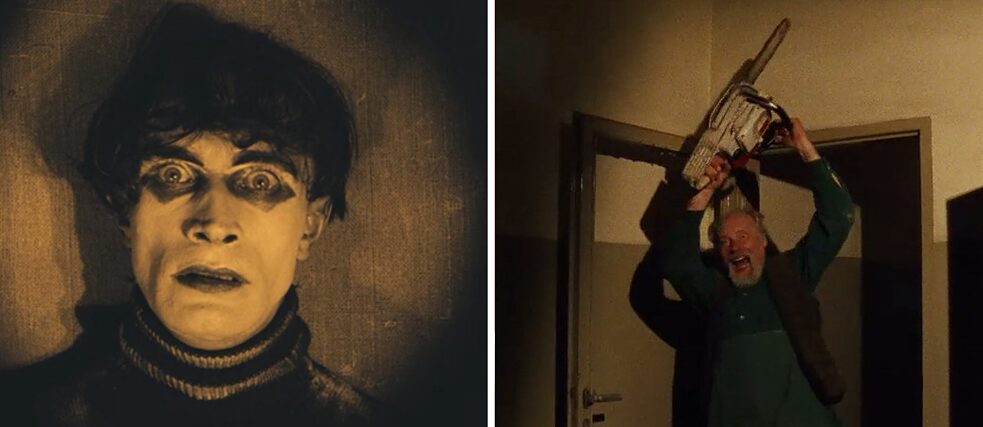German Cinema
From Caligari to Chainsaws: German Genre Films

Since their invention, films have offered a brief escape from the often boring reality of our daily routines. For some filmgoers, there is no better film genre that offers this escape than that of the genre film.
By Daniel Chaffey
Encompassing dark dramas, science fiction, fantasy, thrillers, action, mysteries, and horror films, genre films are recognized as the pure representation of their specific genre. To the outsider, these films seem formulaic, predictable, and lack artistic merit. Fans see them as pushing the boundaries of conventional cinema and testing the limits of the imagination, societal norms, and with German splatter-horror film pioneer Jörg Buttgereit (Nekromantik, 1988), the viewers’ stomachs.
As early as Stellan Rye’s 1913 Der Student von Prag, German filmgoers have been mesmerized by genre films. The brief period of the Weimar Republic (1919-1931) saw a boom in German film production, including groundbreaking horror films like Das Cabinet des Dr. Caligari (1920, Robert Wiene) and Nosferatu (1921, F.W. Murnau), or Fritz Lang’s science fiction masterpiece Metropolis (1925), his mysterious Der Müde Tod (1921) and his chilling crime thriller M (1931). The 1950s and 1960s were marked by the success of Westerns including the West German Winnetou trilogy directed by Harald Reinl and others based on the novels of Karl May. Similarly, so-called East German “Red Westerns” were wildly popular. German co-productions from the 1950s to the 1970s, based on the writings of British Crime novelist Edgar Wallace, are perhaps the best examples of the “Krimi,” or crime film. Even German film and theatre director, Christoph Schlingensief dabbled in the horror/trash genre with Das Deutsche Kettensäge Massaker (1990), starring Udo Kier.
The demand for more German genre films is fueled by dedicated fans, filmmakers, and festivals. Now in its 34th year, Germany’s annual Fantasy Filmfest celebrates genre films as international cinematic art, presenting a touring festival in seven different German cities. Similarly, the Genrenale, launched in 2013, is Germany’s only “100% German Cinema” genre film festival.
More and more, young German and Austrian directors are turning toward genre films for creative freedom found in few other genres, and are reaching international audiences. Of recent productions, the following films barely scratch the surface of contemporary German genre films. Til Kleinert’s Der Samurai (2014) is a gender-bending werewolf hunt through the German countryside, while Nikia Chryssos’ Der Bunker (2015) is a chilling chamber play set in a suburban family’s basement. Katrin Gebbe’s Tore Tanzt (2013) and her more recent German Film Award-nominated Pelikanblut (2019) take two hauntingly different approaches to family dynamics, as does Ich seh, Ich seh (2014), directed by Severin Fiala and Veronika Franz. But not all genre films are destined to remain niche market films. Andreas Prochaska’s Das Finstere Tal (2014), blends elements of the western, thriller, and horror, all of which earned the film team eight German Film Awards. The 2014 cyber-crime Thriller Who Am I – Kein System ist sicher was a German box office success with over 800,000 viewers, helping Baran Bo Odar get his foot in the Hollywood door, and secure a deal with Netflix for the internationally acclaimed series Dark, which he wrote, produced and directed, and is steeped in genre film sensibilities. Even established German filmmaker Fatih Akin’s incredibly graphic portrait of serial killer Fritz Honka, Der Goldene Handschuh (2019), was nominated for five German Film Awards, winning for best makeup. Premiering in the Perspective Deutsches Kino (Perspectives on German Cinema) section at the 2020 Berlinale, Michael Venus’ debut film Schlaf (2020) is a slow-burning, haunting blend of fairytale-like nightmares intertwined with a psychological thriller that blurs the lines between dreams and reality, and offers a glimpse into the future of German genre film, while at the same time digging into the recent German past.
All signs indicate that German genre films are here to stay.